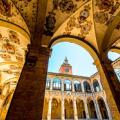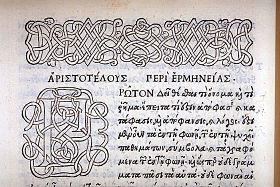356. I’d Like to Thank the Lyceum: Aristotle in Renaissance Italy
Aristotle’s works are edited, printed, and translated, leading to new assessments of his thought among both humanists and scholastics.
Themes:
• L. Bianchi, “Per una storia dell’aristotelismo ‘volgare’ nel renascimento: problemi e prospettive di ricerca,” Bruniana & Campanelliana 15 (2009), 367-85.
• M. Davies, Aldus Manutius: Printer and Publisher of Renaissance Venice (Tempe: 1999).
• E. Del Soldato, Early Modern Aristotle: On the Making and Unmaking of Authority (Philadelphia: 2020).
• E. Kessler et al. (eds), Aristotelismus und Renaissance (Wiesbaden: 1988).
• E. Kessler, “The Transformation of Aristotelianism during the Renaissance,” in J. Henry and S. Hutton (eds), New Perspectives on Renaissance Thought (London: 1990), 137-47.
• C.H. Lohr, Latin Aristotle Commentaries II: Renaissance Authors (Florence: 1988).
• M. Lowry, The World of Aldus Manutius: Business and Scholarship in Renaissance Venice (Oxford: 1979).
• M. Pade (ed.), Renaissance Readings of the Corpus Aristotelicum (Copenhagen: 2001).
• C. Martin, Renaissance Meteorology: Pomponazzi to Descartes (Baltimore: 2011).
• C.B. Schmitt, Aristotle and the Renaissance (Cambridge MA: 1983).
• C.B. Schmitt, The Aristotelian Tradition and Renaissance Universities (London: 1984).
• M. Sgarbi, “Aristotle and the People: Vernacular Philosophy in Renaissance Italy,” Renaissance and Reformation (2016), 59-109.
• M. Sgarbi, "What Does a Renaissance Aristotelian Look Like? From Petrarch to Galilei," Journal of the International Society for the History of Philosophy of Science 7 (2017), 226-45.
Stanford Encyclopedia of Philosophy: Aristotelianism in the Renaissance







Comments
Translating your book on Islamic philosophy
Hi Mr. Peter Adamson, how are you? I wanted to talk to you but couldn't find any other way to contact you. so I assume you read this. we want to translate the third volume of Philosophy Without Any Gaps to the Kurdish language, and for that, we like to have your permission. you can answer me here or contact me with my Email: Bnar98bnar@gmail.com
Christian focus on Aristotle
I was chatting with a friend about getting almost all the way up to date with your podcast, and offhandedly mentioned that Christian philosophers through the Middle Ages (and now into the Renaissance) seemed to talk a lot more about Aristotle than about Christ and the scripture. They speculated it might be that interpreting Christ's words was even more thread-the-needle dangerous than praising the pagan Aristotle, but I'm not so sure about that, and suggested maybe it might be that Blblical interpretation was for the preachers. But now I'm wondering, is my perception just lopsided because of the focus of the podcast?
In reply to Christian focus on Aristotle by Will Maybury
More Aristotle than Christ
Oh yes, that is a misleading result of our focus here on philosophical literature. There was a lot of scholastic work on Aristotle but I guess in terms of sheer quantity this is dwarfed by the amount of medieval Biblical commentary, homiletic literature, ethical writing and so on that is deeply Christian and engaged with Scripture and its exegesis. Even figures like Aquinas wrote (long) commentaries on books of the Bible, not only the more Aristotelian stuff, and we have explicitly theological material from nearly all the major figures whom we covered, like Abelard, Scotus, Ockham, etc. The only exception would be arts masters like the "Latin Averroists" or Buridan, since they were not in the Theology faculty and wrote little or nothing about it.
alessandro piccolomini mechanics
Hello Professor,
Thanks for all the continued hard work on these podcasts. I really enjoyed the last few episodes and interviews. I returned back to listen to this episode again. I would like to know more about the Piccolomini and his dedication to engineers for the translation of the Aristotelian attributed text on mechanics. (I'm an engineer) Are any of the suggested reading texts preferred reading for that topic? Reading time is precious and I'm still working on many other texts that were recommended previously.
Warm regards,
Dave
In reply to alessandro piccolomini mechanics by Dave Lavery
Piccolomini
Yes I know that feeling! I didn't look at a source which talked extensively about that but it is discussed in M. Sgarbi, “Aristotle and the People: Vernacular Philosophy in Renaissance Italy,” Renaissance and Reformation (2016), 59-109, and L. Bianchi, “Volgarizzare Aristotele: per chi?,” Freiburger Zeitschrift für Philosophie und Theologie, 59 (2012), 480-95.
In reply to Piccolomini by Peter Adamson
Thanks very much for the…
Thanks very much for the recommendations. I was able to find both papers. I'll have to admit that as poor as my German is, my Italian is non-existent. A paper in a German journal, beginning with a French quote, that's written in Italian is going to have to remain a mystery to me... Joking aside, thanks again, as the idea of "vulgarization of Aristotle" as making philosophy more available or understandable to a wider audience seems to correlate with the podcast a bit.
Translation and the history of philosophy
You have noted many times the importance of translation to the trajectory of the history of philosophy you are discussing, from the ninth and tenth century translations from Greek to Arabic, twelfth century Arabic to Latin, and now into the vernaculars. Can you recommend several books or articles that focus on the influence of translation on the philosophical tradition, in the West, India, and Africa?
In reply to Translation and the history of philosophy by Harold Augenbraum
Translations
Well, I think I'd just point you to the further reading on the pages for the relevant episodes; or do you mean, like, a book about the whole phenomenon of philosophical translations cross-culturally? I don't know of anything good that spans all those different traditions (unsurprisingly, since it would be hard to have the competence to write such a book!).
Add new comment